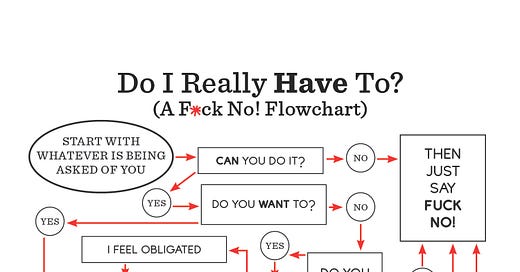Do You Really HAVE To? (A flowchart)
On real vs. perceived obligations, plus a guide to making decisions for all the right reasons.
Greetings, my feisty fucklings! Today’s post is free to all because it contains one of my patented NFG flowcharts, and I cannot in good conscience deprive anyone of a good flowchart.
However, note that some of the links within go to paywalled content for my VIF (Very Important Fuckling) subscribers. If you’d like to be able to read everything now and in…
Keep reading with a 7-day free trial
Subscribe to No F*cks Given® with Sarah Knight to keep reading this post and get 7 days of free access to the full post archives.




